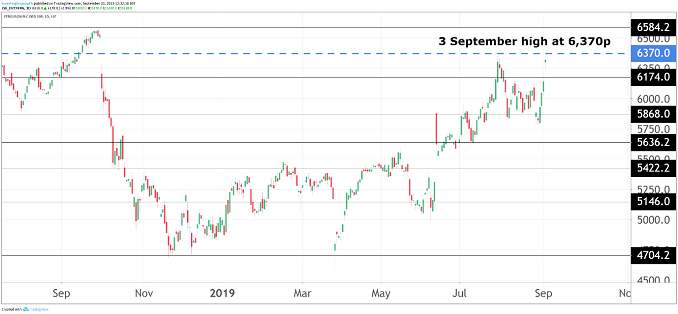Ferguson share price up again as Wolseley demerger confirmed
Two years after the name disappeared from the stock market, Wolseley is set to make a dramatic return.
3rd September 2019 12:50
by Graeme Evans from interactive investor
Two years after the name disappeared from the stock market, Wolseley is set to make a dramatic return.

The transatlantic separation of building supplies firm Ferguson (LSE:FERG) should mean a new lease of life for one of the London market's better-known names, although for investors it's less clear how the plan will impact the parent company's recent lacklustre share price performance.
The historic Wolseley name was replaced in 2017 to reflect the fact that roughly 90% of the group's trading profit is generated in the United States, where the company trades as Ferguson.
Two years on and Wolseley is likely to be revived as a stock market entity after Ferguson announced widely-expected plans to demerge the UK operation and focus solely on North America. It follows pressure on the company from US billionaire investor Nelson Peltz, who recently spent £736 million on a 6% stake to become the second-biggest shareholder.
Ferguson will deny that it has bowed to shareholder activism, noting that today's decision is the conclusion of a detailed review of the group's assets over several years. But the company is clearly under pressure to address its recent share price under-performance.
When disclosing its stake in Ferguson in June, Peltz's Trian Fund Management described Ferguson as an attractive business that trades at a discount to comparable US peers.
Trian's involvement has helped Ferguson's share price to recover to 6,300p in recent weeks, although analysts at UBS noted today that the company's forward price/earnings (PE) multiple of 14.5x was still significantly lower than the average of peers in the US at 20 times.
It's expected that Ferguson will eventually re-list in the United States, although this will need the approval of 75% of shareholders. In the meantime, UBS is reviewing its price target of 5,300p on the basis that the company is able to re-rate from current levels.

Source: TradingView Past performance is not a guide to future performance
UBS added:
"We think the UK de-merger is not that relevant in the context of the group as the UK only accounts for 4% of EBITA and is a relatively small business with about £50 million of earnings. It's not obvious to us that the sale/de-merger of the UK was or is necessary to consider a new listing structure."
Full-year results are due on 1 October, with Ferguson likely to highlight much tougher conditions after third-quarter sales figures showed a slowdown in American growth.
But Ferguson consistently generates strong operating cash flows, amounting to more than US$700 million in each of the last four years. In June it announced a surprise $500 million share buyback, which is taking place over the current year.
It has returned $3.5 billion of surplus cash to shareholders over the last six years and cash flows should remain strong given the current stage of the economic cycle.
In 2018, the group completed the disposal of the Nordics business for about €1 billion, with today's decision to de-merge the UK business into an independent listed company set to leave operations in the United States, Canada and the Netherlands.
The US business, which is the market leading distributor of plumbing and heating products, achieved a trading margin of 8.4% last year compared with 2.8% for the UK operation. The largest end market for Ferguson is residential, which represents about 50% of sales.
The UK operates two businesses under the Wolseley brand serving the trade market through more than 500 branches and six distribution centres.
In April 1986, Wolseley listed on the London Stock Exchange and joined the FTSE 100 index for the first time seven years later. Its connection with Ferguson dates back 35 years after it bought Ferguson Enterprises as its first overseas investment.
Wolseley's financial strength contributed to Ferguson's phenomenal growth in the next decade as it expanded into 13 new states and more than doubled the total number of locations to nearly 200 by the early 1990s.
Wolseley itself dates back to 1887, when 50-year-old Frederick York Wolseley - an Irish immigrant living in Australia - founded the Wolseley Sheep Shearing Machine. His technology would revolutionise the agricultural industry across the globe, with Frederick moving the company to Birmingham two years later.
These articles are provided for information purposes only. Occasionally, an opinion about whether to buy or sell a specific investment may be provided by third parties. The content is not intended to be a personal recommendation to buy or sell any financial instrument or product, or to adopt any investment strategy as it is not provided based on an assessment of your investing knowledge and experience, your financial situation or your investment objectives. The value of your investments, and the income derived from them, may go down as well as up. You may not get back all the money that you invest. The investments referred to in this article may not be suitable for all investors, and if in doubt, an investor should seek advice from a qualified investment adviser.
Full performance can be found on the company or index summary page on the interactive investor website. Simply click on the company's or index name highlighted in the article.